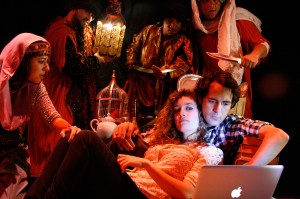1001 by Jason Grote, Company One, Boston Center for the Arts, 7/15/11- 8/13/11, http://www.companyone.org/Season12/1001/synopsis.shtml.
Reviewed by Becca Kidwell

Clockwise from left: Ruby Rose Fox, Ben Gracia, Hampton Fluker, Lonnie McAdoo, Lauren Eicher, Nael Nacer
Scheherazade is back with new tales to tell. Based on 1001 Arabian Nights, Jason Grote takes the ancient tales and reworks them within a twenty-first century context. The frame story and first inner story remain close to the time and arrangement of the original tales, but the further Scheherazade takes us in, the closer we get to our own reality. Stories make up a large part of our lives from the fairy tales of childhood to the novels of our adulthood. Is it what we bring to them that gives them life or what they bring to us that give us life? Company One’s 1001 attempts to answer these questions.
The outer stories that frame the play come directly from the frame story and initial stories of 1001 Arabian Nights. Shahriyar (played by Nael Nacer) has found the way to keep his wives from being corrupt. He marries them, beds them, and then beheads them. Nael Naecer’s stuttering and bumbling Shahriyar effectively demonstrates that it is only Shahriyar’s power that allows him to commit acts that would not be acceptable under any other circumstance. However, he has not accounted for the shrewd nature of his servant’s daughter whose life is spared by her effective storytelling. This Scheherazade (played by Lauren Eicher) does not only have tales of the far lands of the Middle East but also has tales of the strange land of New York City. She does not tell her stories in a linear fashion, but insists on intertwining the stories in a seeming haphazard though deliberate way. As Scheherazade, Lauren Eicher entrances the characters of the play and the audience with her beauty and mystery.
As she travels with her stories to New York City, Scheherazade’s characters encounter modern and post-modern storytellers such as Jorge Luis Borges and Gustave Flaubert. The modern characters also run into Alan Dershowitz and Osama Bin Laden. Ben Gracia, Ruby Rose Fox, Lonnie Mcadoo, and Hampton Fluker flex their acting muscles by inhabiting the majority of the characters in the stories. Lauren Eicher and Nael Naecer provide the anchors as the ancient couple of Scheherazade and Shahriyar; and also, they play the modern anchors in the couple of Dahna and Alan. Dahna and Alan mirror Scheherazade and Shahriyar in that they have to figure out which way their story will go by relying on the past, present, and future.
The play moves fast with Tarantino-like twists and turns; it takes some time afterwards to fully absorb all of the action within the play. And yet, it has the safety of the storytelling format to keep us from being alienated. While this may seem strange, Jason Grote’s idea demonstrates that stories are not simply a product of the time they are written, but they are a product of the past, present, and the future; we can neither deny how stories influence us nor how our own personal experiences change the tales.
